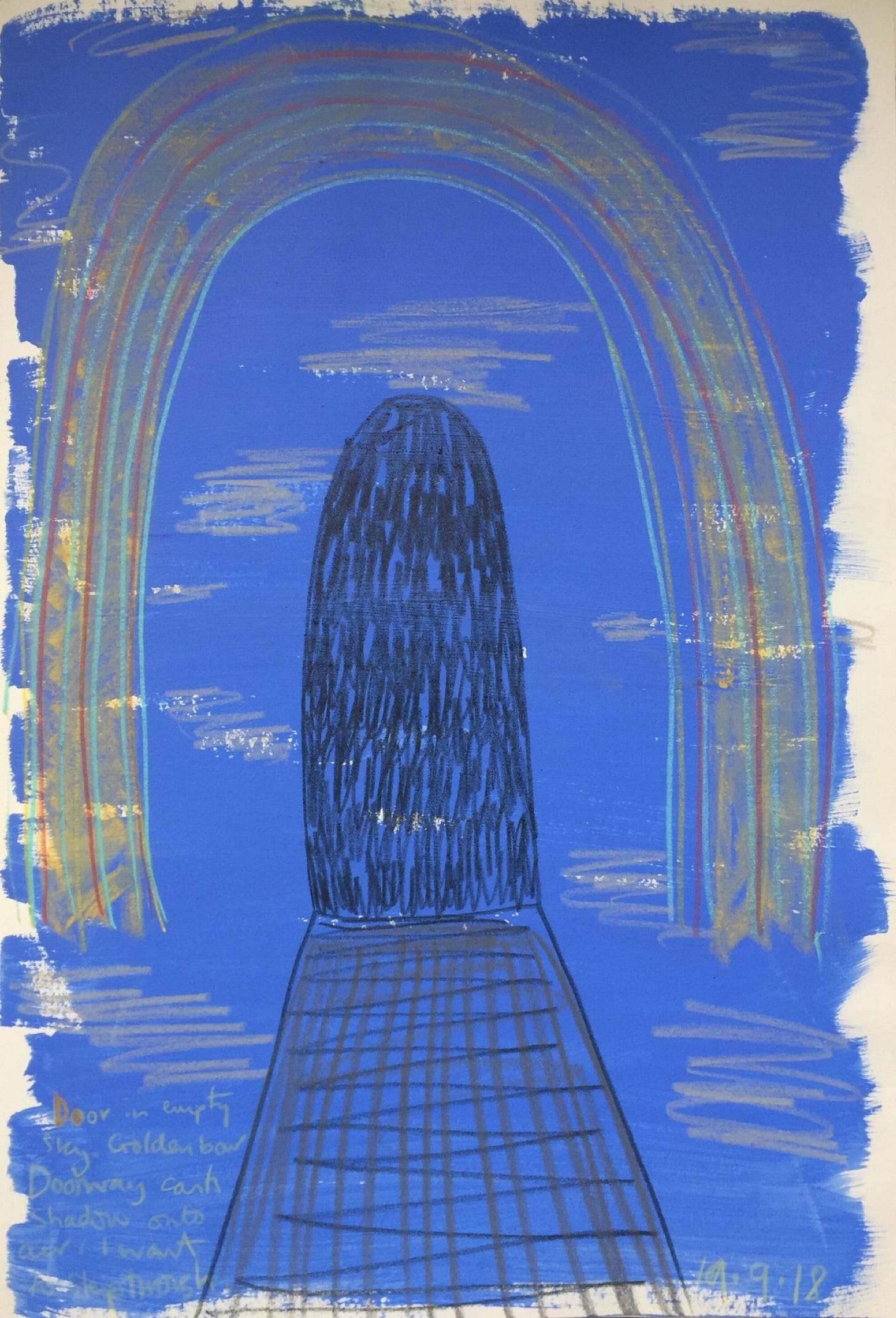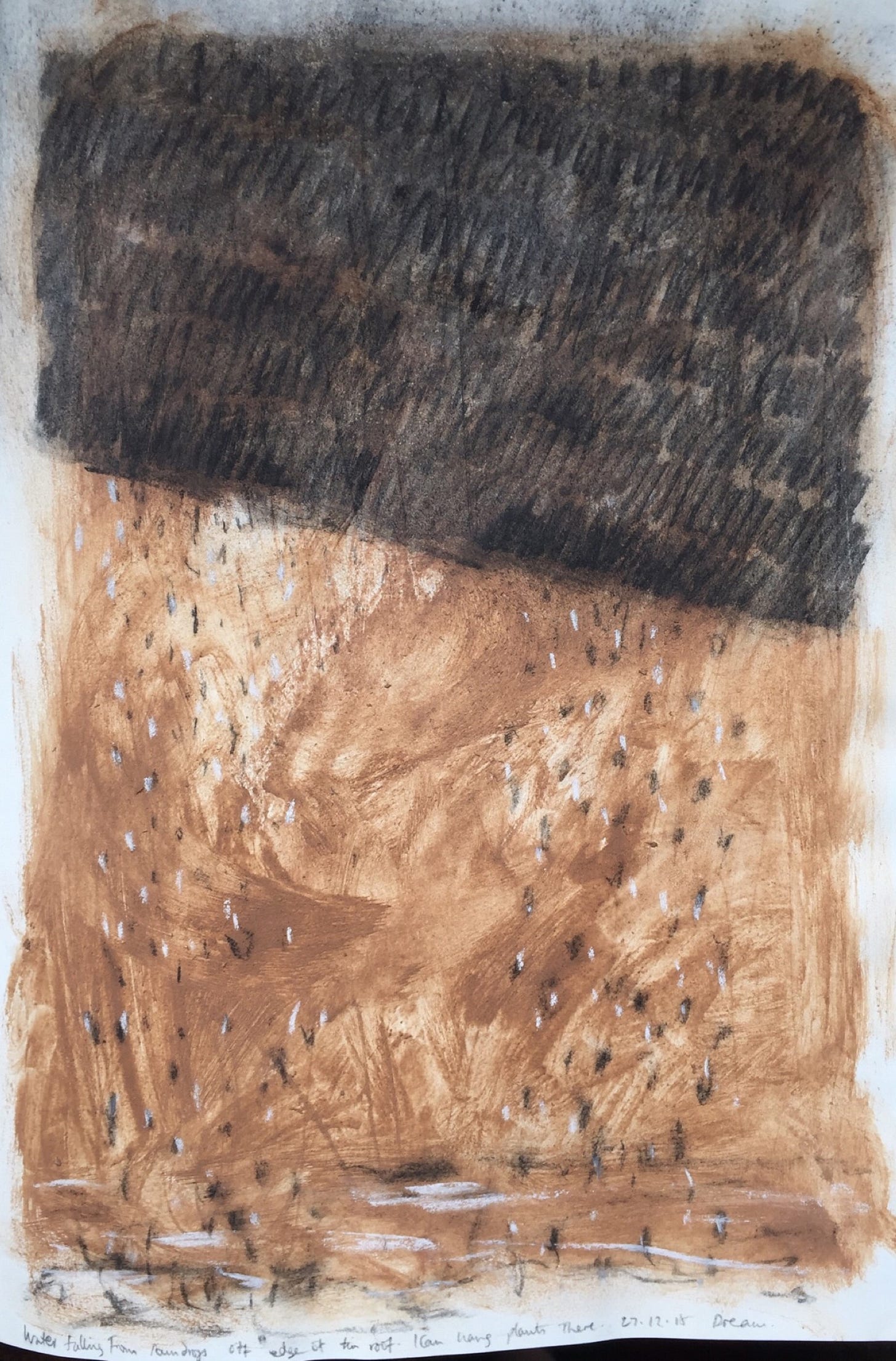This weekend I am in Vermont enjoying the dark skies full of stars and the hills full of blossom. We have seen peregrine falcons and we think we heard a mountain lion just now in the valley. Next week sees 6 months since I started writing here on Substack, and I will write about what’s coming next then. Though I have enjoyed venturing into discursive writing, prompted by great writing by others, my desire is to return to my roots: Tao, the embodied life and practical methods for saner, more connected lifeways. I am pretty sure you can get some extra opinions on current affairs elsewhere on the internet if you need them, no-one’s going to miss mine. Today I wanted to give you something really useful that took me years to develop and hone, but has been proved effective by many people who have tried it.
Over fifty artists, writers and T’ai Chi colleagues have used this practice to feed into their work or to gain connection to a wellspring of unconscious creativity. I hope it is of benefit to you. Please do get in touch if it is.
Audio version
A simple method for remembering our dreams (or making it more likely).
I have had several periods in life where I could easily remember my dreams. However, in my early 30s, I seemed to lose this ability, so I made a concerted effort to do so again for several reasons. What follows is a simple method I distilled from books and practical trials, that I have used myself to make it more likely that I remember my dreams, so that I can record them. I have also added a few examples of different ways of recording them that have worked for me and for my friends and students. I have taught perhaps 50 people this method in person and have never heard of any ill effects.
I would like to mention a few reasons why working on remembering your dreams might be temporarily unhelpful or inadvisable. If you suffer from insomnia, or find it hard to get to sleep, this might not be for you at this time. If you frequently suffer from bad dreams or nightmares, you may prefer not to remember them more than you do until you feel the time is right. If you are engaged in a psycho-therapeutic process, or are in psychological or psychiatric treatment, then it would be better to discuss this with your therapist first. I trust that if you are an adult who is in general good health, then you can make up your own mind about working with the practice of remembering and recording dreams, whether or not you go on to work with the content of those dreams. I make no claims for this method other than that it has worked for me and others to be able to remember our dreams more easily.
Instructions
30 minutes before bedtime say out loud to yourself something along the lines of. ‘I would like to remember my dreams tonight,’ ‘I intend to remember my dreams tonight.’ Say these 3 or 4 times, as you go about brushing your teeth, walking the dog last thing at night, while getting changed, or in any private moments. (What I say to myself is a bit more conversational, as my unconscious seems to respond better: ‘Hey dreaming Caro, I’d really like help to remember my dreams tonight.’) Find the words that feel right for you, in your mother tongue, as this sets the intent better. Saying it out loud works many times better than just thinking it, as it involves more of the whole body – breath, vocal cords, muscles, ears, mouth, and then all those diverse connections in the brain which correspond.
If possible, say it a few times before you go to sleep, when your head is actually on your pillow. If this would disturb your sleeping partner / roommate, then just mouth it silently. This is still more effective than just thinking it in your mind.
Do this each night until you start to recall things. It is hard not to get frustrated if it doesn’t work straightaway but keep at it. If you are not used to setting your intent for tasks, it can take a while (weeks or a month) to get it, especially for such a subtle ‘project’.
That’s it. Simple is best.
It can be enhanced by writing these lines by hand occasionally in your journal or to do list, in doodles, or in other handwritten or drawn ways. Again, the more one’s whole organism is involved, the more effective. You can also sing it to yourself like a jingle, and it works like a nursery rhyme… If you find other ways that work for you, I’d be very happy to hear of them.
Simple ways to record dreams (without interfering with them)
1: Keeping a notepad and pencil by the bed and a low light source easily available so you can write things down whenever you might naturally wake up. This may not be suitable for those who share a room or bed, but a tiny orange glow light and a dark pencil on paper can be good. Some people find just writing a few words in the dark on a larger pad with a marker pen so they can ‘scrawl’ does a better job, and they augment the detail when they get up. For my first 5 years of dream practice I used a pen and large post it notes, with the time of the dream also noted. These were then written up in books. Nowadays I type them up on my PC and save them by date.
2: Voice recording. One of my T’ai Chi students swears by using the voice recording function on his phone, and he just wakes up and whispers straight into it as soon as he can, with the phone set to lowest light settings. He then transcribes using the speech-to-type function of his phone and adds details on his laptop later.
3: Using the notepad function of a smartphone to type up on low light settings when you wake. As such a large percentage of people now have phones near them at night as alarm clocks, even if on ‘airplane mode’, this can be handy. Some people find this wakes them too much.
4: Making long hand or typed notes as soon as you get up. As you develop good recall, you can make a cuppa, then type or write at your leisure before the day’s events.
5: Speaking in person or by phone with your partner, family, dream-buddy, friend, etc, and recording notes on what is said for each other. This is actually the best possible method but requires a life and relationships that enable it. People from whom I have learned much about dreaming method have done this for many years.1 When I have had the chance to do this, it has been of great benefit, as it both requires and fosters trust, empathy, understanding and intimacy. A further stage on from this is to investigate the dream further with help from the partner (without interpretation) so that all the details are recorded, and nothing has been missed, including one’s body language and tone of voice while recounting.
6: Draw or make an object from the dream. I frequently choose the strongest or most telling image from the dream and draw it simply in ink or charcoal with no special care, just allowing my hand to move freely and make the raw image. I photograph these dream drawings and keep them by date with the type-written dreams. You can draw the image later on, days, or even years later, if the image still persists in your mind’s eye. Musical tunes from dreams, sculpted objects and dance or physical movements can also be recorded, if those methods appeal to you.
7: The title you give the dream is sometimes almost enough to bring back total recall of the whole dream later on. It is always worth titling the dream with something that encapsulates the whole dream in a nutshell.
Here are a few further things that it can be interesting to note down along with the apparent content of the dream.
1: Time of dream (this can be helpful as you may record several from one night)
2: Overall mood of dream
3: Mood upon waking (this may differ vastly from the dream mood or content)
4: Physical sensations during sleep (heat, cold, movement, pains)
5: Physical sensations upon waking
6: Song, tune or lyrics in head upon waking (often a cause for laughter due to aptness)
7: Echoes in that day’s waking life (eg. dream of a blackbird, then that is first thing you see on waking)
8: Any dream objects that felt particularly noticeable or seemed out of place in the dream
9: Whether the dream or its content, characters, or other characteristics are recurrent
And then later:
10: Who or how you may have shared or relayed this dream to anyone else, or had felt compelled to do so, even if you did not.
11: Whether you later make any art / writing / objects / music / projects / decisions / life changes based on this dream.
There are surely 10,000 other things this could lead us into discussing, even if we do not ever touch on interpretation of dreams or ‘making use’ of dreams. But I do hope you get along well with this method which has worked so well for me. It is important to say that it does not matter at all if we do or do not successfully remember our dreams. Like all mammals, we dream every time we are in REM sleep. Whatever it is dreams are doing or being for humans, they are pervasive, ubiquitous, and innate. Dreams are already naturally doing what they are meant to be doing. What I propose by this practice is akin to a small, well-camouflaged birdwatcher’s hide in an old-growth forest that we set up and then we relax and look closely at what can be seen in the wild. We aim for non-interference, a profound interest in the natural behaviour of what is watched, and a patient and non-judgmental gaze.2
This week’s good thing: It’s my first time in this state (my 32nd visited of the 50) and I have just been staying at In Situ Polyculture Commons (ISPC) which is a non-profit arts residency, commons and cultural catalyst located in Southeastern Vermont. We’ve been there teaching Parchment, Paint and Pens, a new collaboration between me and Dr Theresa Emmerich Kamper. We finished a few hours ago and are sitting listening to Green Lung and Pagan Altar with our hosts while drinking a well-earned glass of wine. In Situ run residencies, host events and make great things happen in their area. I plan to be back as soon as possible. The arts, food and community culture is rich here. Check them out.
Charlotte DuCann and Mark Watson
This piece was first published in The Long Table, and online group for members of A School Called Home.









There are sleep recording apps out there for people who are tracking sleep talk / snoring. It’s great to record dreams, you don’t event need to open your eyes because the recorder is automatic!
In a beautiful synchronicity, last night I found an old notebook which I had briefly used as a dream diary in 2019, and on reading through the entries I was amazed at how viscerally I could recall them - dreams I had entirely forgotten otherwise. Some dreams stick with me powerfully, to the point I can half-convince myself there is no reason to record the less ‘significant’ dreams, but since finding that notebook and reading your words here I feel encouraged me to think again about recording them, and also about (re-)cultivating the habits that support good, deep dreaming.